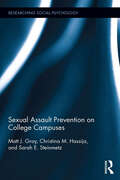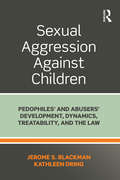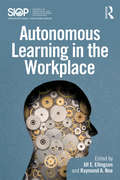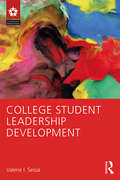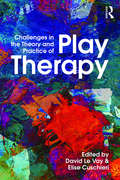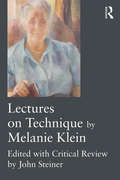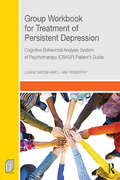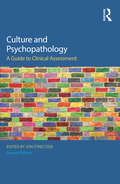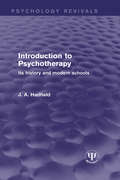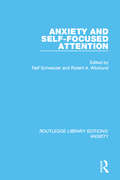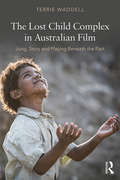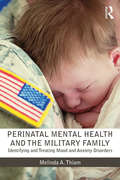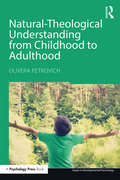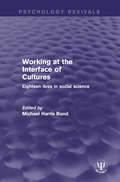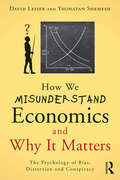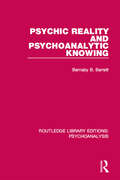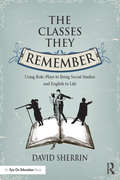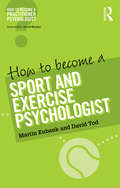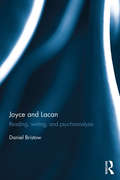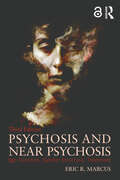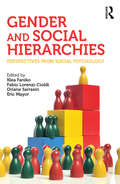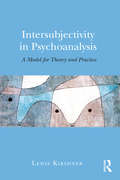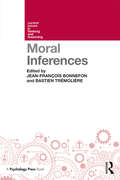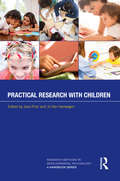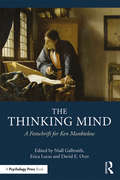- Table View
- List View
Sexual Assault Prevention on College Campuses (Researching Social Psychology)
by Matt J. Gray Christina M. Hassija Sarah E. SteinmetzSexual assault continues to be a problem on college campuses despite greater attention to reducing rates of assault and an increased presence in the public discourse. Programming has been historically directed towards women by providing them with information about how to keep themselves safe rather than confronting a climate conducive to sexual violence. This important volume illuminates the urgency of combating sexual violence on college campuses. The authors depict in detail empirically supported approaches to combating climates conducive to sexual violence and ways to empower all members of the campus community to actively prevent sexual violence.
Sexual Aggression Against Children: Pedophiles’ and Abusers' Development, Dynamics, Treatability, and the Law
by Jerome Blackman Kathleen DringIn Sexual Aggression Against Children: Pedophiles’ and Abusers' Development, Dynamics, Treatability, and the Law, Drs. Blackman and Dring use multiple psychoanalytic principles to answer, “Why do people sexually abuse children?” and “Why are most abusers male”? They address the legal and mental health professions’ minimization of the horrific nature of child sexual abuse, explain how to assess pedophiles’ treatability, and discuss cases of adolescent and adult predators. Also, developmental analysis of sexual predation is integrated with a review of judicial decisions regarding civil commitment and punishment of abusers. The authors suggest how courts, evaluators, and legislatures can preserve constitutional rights of sexual offenders while prioritizing protection of children.
Autonomous Learning in the Workplace (SIOP Organizational Frontiers Series)
by Jill E. Ellingson Raymond A. NoeTraditionally, organizations and researchers have focused on learning that occurs through formal training and development programs. However, the realities of today’s workplace suggest that it is difficult, if not impossible, for organizations to rely mainly on formal programs for developing human capital. This volume offers a broad-based treatment of autonomous learning to advance our understanding of learner-driven approaches and how organizations can support them. Contributors in industrial/organizational psychology, management, education, and entrepreneurship bring theoretical perspectives to help us understand autonomous learning and its consequences for individuals and organizations. Chapters consider informal learning, self-directed learning, learning from job challenges, mentoring, Massive Open Online Courses (MOOCs), organizational communities of practice, self-regulation, the role of feedback and errors, and how to capture value from autonomous learning. This book will appeal to scholars, researchers, and practitioners in psychology, management, training and development, and educational psychology.
College Student Leadership Development (Leadership: Research and Practice)
by Valerie I. SessaCollege Student Leadership Development introduces the idea that we all play a part in producing leadership and that learning how to participate in the process of leadership is something that all college students need to learn as part of their college academic experience. Rather than approaching leadership from the traditional model emphasizing specific skill sets, this book acquaints students with how to learn leadership using the ReAChS model of leadership development (Reflection, Assessment, Challenge, Support). It then encourages students to directly engage their own experiences to hone their leader identity and understanding of leadership as well as improve their leadership knowledge and skills. Step-by-step exercises lead students in reflecting on their experiences, assessing themselves, choosing challenges, creating support networks, and finally capturing and communicating to others what they have learned. Throughout, examples of student leaders’ experiences provide readers with powerful examples of others’ successes and struggles in leadership alongside the latest psychological research on learning and development.
Challenges in the Theory and Practice of Play Therapy
by David Le Vay Elise CuschieriChallenges in the Theory and Practice of Play Therapy provides an advanced and in-depth exploration of the issues and challenges relating to the training, theory and practice of Child-Centred Play Therapy. The ethos of the book is process orientated, and it discusses the particular therapeutic challenges that are encountered on a day-to- day basis. Drawing upon clinical material and cutting-edge theory, David Le Vay and Elise Cuschieri bring together experienced practitioners from the field to explore key topics such as: The therapeutic use of self within play therapy Gender issues in play therapy The play therapist’s experience of self-doubt Working with acquired brain injury Working with developmental trauma The role of research within play therapy The role of experiential training groups in a play therapy training programme Original and stimulating, Challenges in the Theory and Practice of Play Therapy will be of interest and value to all those working within the area of child mental health, both in practice and in training, and particularly those in the wider Arts and Play Therapy community who are working therapeutically with troubled children.
Lectures on Technique by Melanie Klein: Edited with Critical Review by John Steiner
by Melanie KleinLectures on Technique by Melanie Klein is based on a series of six lectures given by Melanie Klein to students at the British Psychoanalytical Society in 1936 and repeated several times in subsequent years. They were discovered in the Melanie Klein Archives housed in the Wellcome Medical Library and have been previously described by Elizabeth Spillius but never before published. In this book, John Steiner explores what characterises Kleinian Technique, how her technique changed over the years, what she saw as the correct psychoanalytical attitude and how psychoanalytic technique has changed since Klein’s death. Melanie Klein, who moved to England from Berlin in 1927, became one of the leading psychoanalysts, following Freud and making an important contribution in the theory and practice of psychoanalysis. A pioneer in child analysis, her work remains widely influential throughout the world. This book consists of the full text of the original six lectures, accompanied by a critical analysis from John Steiner who is known internationally as a leading Kleinian analyst and writer. Steiner demonstrates the importance of the lectures in understanding Klein’s work and their continued relevance for contemporary psychoanalysis. In addition, also published for the first time, this book includes annotated transcripts of a preserved recording of a seminar Klein held in 1958 with young analysts of the British Psychoanalytical Society. In this seminar, close to the end of her life, many of the points made in the earlier lectures were elaborated upon and brought further up to date in light of developments in Klein’s thinking during the intervening years. Featuring rare, previously unpublished material, Lectures on Technique by Melanie Klein provides a new and significant contribution to understanding of the Kleinian paradigm. It will be essential reading for all psychoanalysts and psychoanalytic psychotherapists interested in and influenced by Klein’s work and legacy.
Group Workbook for Treatment of Persistent Depression: Cognitive Behavioral Analysis System of Psychotherapy-(CBASP) Patient’s Guide
by Liliane Sayegh J. Kim PenberthyThe Group Workbook for Treatment of Persistent Depression is a guide for patients suffering from persistent depression who participate in group therapy. The workbook provides handouts and skills training that require the help of a trained professional to teach and animate in a group format. Patients will be able to maximize their acquisition of emotion coping skills by using this book in conjunction with Group-CBASP sessions.
Culture and Psychopathology: A Guide To Clinical Assessment
by Jon StreltzerSince the first edition of Culture and Psychopathology was published, a growing national and international interest in how culture impacts mental disorders and how psychopathology is influenced by culture has become a rising field of focus. In this extensive revision, chapters have been updated with new material and now incorporate the DSM-5’s classification system of mental disorders. This book is international in scope, not focusing on specific cultural groups, but rather how the cultural context affects the presentation and the process of assessment of different types of psychopathology. This edition highlights case studies and practical guidelines to support clinicians who assess patients of any cultural background.
Introduction to Psychotherapy: Its History and Modern Schools (Psychology Revivals)
by J. A. HadfieldFirst published in 1967, the original blurb reads: This book is intended to give the intelligent lay reader a comprehensive view of the subject of psychotherapy, the treatment of nervous disorders by mental means. These disorders are of increasing importance on account of their wide-spread nature and of the misery they produce. It describes the development of psychotherapy as employed by the most primitive peoples and races, through animal magnetism and hypnotism to the more modern analytical schools of Freud, Jung and Adler. It sets out in particular to give the positive contributions of these various systems, although this does not preclude criticism of their weaknesses and more dubious theories. Dr Hadfield has had the widest experience, having treated psychoneurotic disorders for over fifty years, including the war neuroses in the two world wars, both in the Navy and in the Army; and, as Lecturer in the University of London in the subject for over forty years, he has had the opportunity to systematize the knowledge thus obtained. As a result of this experience he has come to conclusions as to the nature, causes and treatment of such disorders differing somewhat from those of the established Schools, and it is these findings which are given in the latter part of the book under the title, ‘Direct Reductive Analysis’. The book will be useful to all those – teachers and parsons as well as medicals – who have to deal with human beings and their aberrations, and to them it is addressed.
Anxiety and Self-Focused Attention (Routledge Library Editions: Anxiety)
by Ralf Schwarzer Robert A. WicklundFirst published in 1991, this book consists of 13 articles that were originally published in the journal Anxiety Research. They address the topic of anxiety and self-focused attention from a variety of perspectives, representing recent advances in social, clinical and personality psychology at the time. As a whole, the book poses a stimulating theoretical challenge to traditional anxiety research, which had been dominated by psychometric issues, clinical case studies and stable personality constructs. The contributors share the view that anxiety is an emotional state of distress dependent upon specific antecedent cognitive processes such as self-awareness, perceived role discrepancy or unfavourable expectancies.
The Lost Child Complex in Australian Film: Jung, Story and Playing Beneath the Past
by Terrie WaddellThe mythologising of lost and abandoned children significantly influences Australian storytelling. In The Lost Child Complex in Australian Film, Terrie Waddell looks at the concept of the ‘lost child’ from a psychological and cultural perspective. Taking an interdisciplinary Jungian approach, she re-evaluates this cyclic storytelling motif in history, literature, and the creative arts, as the nucleus of a cultural complex – a group obsession that as Jung argued of all complexes, has us. Waddell explores ‘the lost child’ in its many manifestations, as an element of the individual and collective psyche, historically related to the trauma of colonisation and war, and as key theme in Australian cinema from the industry’s formative years to the present day. The films discussed in textual depth transcend literal lost in the bush mythologies, or actual cases of displaced children, to focus on vulnerable children rendered lost through government and institutional practices, and adult/parental characters developmentally arrested by comforting or traumatic childhood memories. The victory/winning fixation governing the USA – diametrically opposed to the lost child motif – is also discussed as a comparative example of the mesmerising nature of the cultural complex. Examining iconic characters and events, such as the Gallipoli Campaign and Trump’s presidency, and films such as The Babadook, Lion, and Predestination, this book scrutinises the way in which a culture talks to itself, about itself. This analysis looks beyond the melancholy traditionally ascribed to the lost child, by arguing that the repetitive and prolific imagery that this theme stimulates, can be positive and inspiring. The Lost Child Complex in Australian Film is a unique and compelling work which will be highly relevant for academics and students of Jungian and post-Jungian ideas, cultural studies, screen and media studies. It will also appeal to Jungian psychotherapists and analytical psychologists as well as readers with a broader interest in Australian history and politics.
Perinatal Mental Health and the Military Family: Identifying and Treating Mood and Anxiety Disorders
by Melinda A. ThiamThis multi-disciplinary resource provides an overview of perinatal mental and physical health issues within the military population. Perinatal mental health has far-reaching implications for military readiness. The text provides insights to the effects of military culture on identification, evaluation, and treatment of perinatal mood and anxiety disorders and is an invaluable resource for military and civilian primary and behavioral health providers.
Natural-Theological Understanding from Childhood to Adulthood (Essays in Developmental Psychology)
by Olivera PetrovichIt is commonly assumed that young children only begin to think about God as a result of some educational or cultural influence, perhaps provided by their parents. Natural-Theological Understanding from Childhood to Adulthood asks if there is anything about God that children can know independently of any specific cultural input; does their knowledge of God simply come from their everyday encounters with the surrounding world? Whilst children’s theoretical reasoning in biology, physics and psychology has received considerable attention in recent developmental research, the same could not be said about their religious or theological understanding. Olivera Petrovich explores children’s religious concepts, from a natural-theological perspective. Using supporting evidence from a series of studies with children and adults living in as diverse cultures as the UK and Japan, Petrovich explains how young children begin to construct their everyday scientific and metaphysical theories by relying on their own already advanced causal understanding. The unique contribution that this volume makes to the developmental psychology of religion is its contention that religion or theology constitutes one of the core domains of human cognition rather than being a by-product of other core domains and specific cultural inputs. Natural-Theological Understanding from Childhood to Adulthood is essential reading for students and researchers in cognitive-developmental psychology, religious studies, education and cognitive anthropology.
Working at the Interface of Cultures: Eighteen Lives in Social Science (Psychology Revivals)
by Michael Harris BondBehind the mask of objective science lie the dynamics of what happens to scientists who go to live and work in another culture. Those who work and study in an alien culture often find themselves changed in ways that affect their scientific work. How does this challenge, stimulate, provoke, suggest and inspire advances and novelty in their theories, methods and instruments? Originally published in 1997, each of the essays in this title explores these issues through the experiences of a distinguished practitioner, describing the process of intellectual growth and development. Chosen for their extensive experience with people holding a different worldview, the authors have all achieved renown for their contributions to the social science of culture.
How We Misunderstand Economics and Why it Matters: The Psychology of Bias, Distortion and Conspiracy
by David Leiser Yhonatan ShemeshThis is the first book to explain why people misunderstand economics. From the cognitive shortcuts we use to make sense of complex information, to the metaphors we rely on and their effect on our thinking, this important book lays bare not only the psychological traits that distort our ability to understand such a vital topic, but also what this means for policy makers and civil society more widely. Accessibly written, the book explores the mismatch between the complexities of economics and the constraints of human cognition that lie at the root of our misconceptions. The authors document and explain the gamut of cognitive strategies laypeople employ as they grapple with such complex topics as inflation, unemployment, economic crises, finance, and money in the modern economy. The book examines sources of misconceptions ranging from the intentionality fallacy, whereby economic phenomena are assumed to have been caused deliberately rather than to have come about by an interplay of many agents and causal factors, to the role of ideology in framing economic thinking. Exposing the underlying biases and assumptions that undermine financial and economic literacy, and concluding with recommendations for how policies and ideas should be framed to enable a clearer understanding, this will be essential reading not only for students and researchers across psychology and economics, but also anyone interested in progressive public policy. Visit the associated website for the book here: http://www.misunderstandeconomics.com/
Psychic Reality and Psychoanalytic Knowing (Routledge Library Editions: Psychoanalysis #3)
by Barnaby B. BarrattHow do we know our mental life, and how is our mental life altered by our efforts to know it better? Originally published in 1984, this title attempts an epistemological and ontological discourse concerning the understanding of human mental processes, and it aims toward a definitive thesis on the dialectics of knowing and being in this work of psychological understanding. What this work reconfronts are questions pertaining to all psychology and to all human sciences. Yet much of its focus is on the understanding of unconscious mental contents, on the question of knowing and being in Freud’s psychology.
The Classes They Remember: Using Role-plays And Mock Trials To Bring Social Studies And English To Life
by David SherrinLearn how to use role-plays to bring history and literature to life! When students take on the roles of historical or literary figures, they develop a greater understanding of characters’ identities and motivations, and are able to more deeply explore and reflect upon key issues and themes. In this new book from award-winning teacher David Sherrin, you’ll find out how this lively instructional format will make teaching a more immersive, interactive, and memorable experience for your middle school and high school students. The book includes: <P><P> A clear how-to guide to get the most out of role-playing in your class; Ready-made units and lessons to get you started right away, complete with sample scripts, scaffolding worksheets, and assessment rubrics; Templates and step-by-step instructions to help you design your own role-plays. <P><P> The pre-made units, which Sherrin spent years refining in his classroom, cover historical topics such as the rise of Nazi Germany and the Spanish conquest of the Aztecs. You’ll also find fun and interactive role-plays based on literary works like The Pearl and Fences. These lessons will help students at all ability levels to become better communicators, problem-solvers, and creative thinkers.
How to Become a Sport and Exercise Psychologist (How to become a Practitioner Psychologist)
by Martin Eubank David TodWhether you are an athlete suffering from nerves or someone who lacks motivation to exercise, sport and exercise psychology can help. As the discipline of psychology evolves, more and more people are training to become sport and exercise psychologists. But how do you qualify, and when you do, what is the job really like? This is the first guide to this fascinating and growing profession. It provides an overview of what the role involves, the educational qualifications and training you will need to take, and what those first few years in the job are actually like. It includes a wealth of tips on how to make the most of the opportunities available. The book also features testimonials from people currently working in the field, who reveal not only what helped them along the way, but also what they would have done differently. How to Become a Sport and Exercise Psychologist is authored by two of the leading academics within sport and exercise psychology in the UK, both of whom have a wealth of experience in the field. The guide is the perfect companion for anyone considering this exciting career.
Joyce and Lacan: Reading, Writing and Psychoanalysis
by Daniel BristowWhat happens when the intellectual giant of twentieth-century literature, James Joyce, is made an object of consideration and cause of desire by the intellectual giant of modern psychoanalysis, Jacques Lacan? This is what Joyce and Lacan explores, in the three closely interrelated areas of reading, writing, and psychoanalysis, by delving into Joyce’s own relationship with psychoanalysis in his lifetime. The book concentrates primarily on his last text, Finnegans Wake, the notorious difficulty of which arises from its challenging the intellect itself, and our own processes of reading. As well as the centrality of the Wake, concepts of Joycean ontology, sanity, singularity, and sexuality are excavated from sustained analysis of his earliest writings onward. To be ‘post-Joycean’, as Lacan describes it, means then to be in the wake not only of Joyce, but also of Lacan’s interventions on the Irish writer made in the mid-70s. It was this encounter that gave rise to concepts that have gained currency in today’s psychoanalytic theory and practice, and importance in wider critical contexts. The notions of the sinthome, lalangue, and Lacan’s use of topology and knot theory are explored within, as well as new theories being launched. The book will be of interest to psychoanalysts, literary theorists, and students and teachers of literature, theory, or the works of Joyce and Lacan.
Psychosis and Near Psychosis: Ego Function, Symbol Structure, Treatment
by Eric MarcusThe goal of psychotherapy as formulated in this revision of a classic text is to improve ego function of severely disturbed patients who are often hospitalized. This book shows why and how. It describes the psychotherapeutic techniques that aid patients to understand the meaning of the psychotic symbols so that they can experience reality and their emotions as separate entities. Medication effects and the neurobiology of psychotic and near psychotic patients are explained and evaluated in terms of specific ego dysfunction so that psychopharmacology may be targeted. With the first edition originally a recipient of the prestigious Heinz Hartmann Award, this valuable resource is a go-to guide for clinicians who treat patients suffering from crippling mental disorders.The Open Access version of this book, available at http://www.taylorfrancis.com, has been made available under a Creative Commons [Attribution-Non Commercial-No Derivatives (CC-BY-ND)] 4.0 license.
Gender and Social Hierarchies: Perspectives from social psychology
by Eric Mayor Klea Faniko Fabio Lorenzi-Cioldi Oriane SarrasinGender and Social Hierarchies offers a fresh and coherent picture of applied research from within social psychology on the intricate relationship between gender and social status. It comprises a collection of innovative approaches which seek to understand the pervasiveness of status asymmetry between gender categories. Drawing upon recent theoretical advances in gender psychology, the book provides tools for developing practical and political recommendations to address and resolve status inequality today. Each chapter examines a different aspect of the impact that gender-based social hierarchies have on people’s lives. Part One explores the consequences of gender stereotypes in school, higher education, and in professional settings. The struggles faced by women in the workplace are discussed in Part Two, featuring topics such as work-life balance, the ‘glass cliff’, and the lack of support for affirmative action. Part Three is devoted to the antecedents and consequences of gender-based forms of prejudice, such as discrimination against gay men, and against women within cultural minorities. The book concludes with some practical suggestions for working towards lasting and beneficial change. Gender and Social Hierarchies will appeal to scholars and students across the social sciences and offers important insights to practitioners and policy-makers.
Intersubjectivity in Psychoanalysis: A Model for Theory and Practice
by Lewis KirshnerIn this book, Lewis Kirshner explains and illustrates the concept of intersubjectivity and its application to psychoanalysis. By drawing on findings from neuroscience, infant research, cognitive psychology, Lacanian theory, and philosophy, Kirshner argues that the analytic relationship is best understood as a dialogic exchange of signs between two subjects—a semiotic process. Both subjects bring to the interaction a history and a set of unconscious desires, which inflect their responses. In order to work most effectively with patients, analysts must attend closely to the actual content of the exchange, rather than focusing on imagined contents of the patient's mind. The current situation revives a history that is shaped by the analyst's participation. Supported by numerous case studies, Intersubjectivity in Psychoanalysis: A Model for Theory and Practice is a valuable resource for psychotherapists and analysts seeking to refine their clinical goals and methods.
Moral Inferences (Current Issues in Thinking and Reasoning)
by Bastien Trémolière Jean-Francois BonnefonMoral Inferences is the first volume to thoroughly explore the relationship between morality and reasoning. Drawing on the expertise of world-leading researchers, this text provides ground-breaking insight into the importance of studying these distinct fields together. The volume integrates the latest research into morality with current theories in reasoning to consider the prominent role reasoning plays in everyday moral judgements. Featuring contributions on topics such as moral arguments, causal models, and dual process theory, this text provides a new perspectives on previous studies, encouraging researchers to adopt a more integrated approach in the future. Moral Inferences will be essential reading for students and researchers of moral psychology, specifically those interested in reasoning, rationality and decision-making.
Practical Research with Children (Research Methods in Developmental Psychology: A Handbook Series)
by Jo Van Herwegen Jess PriorPractical Research with Children is designed to help the reader understand techniques for research with children, based on real world experience. The book describes a wide range of research methods, focusing equally on quantitative and qualitative approaches, and considers how different methods can be integrated. It highlights the benefits and challenges of each method and gives emphasis to best practice, with expert guidance on how to avoid potential pitfalls in order to obtain valuable insights into how children develop. The volume includes fifteen chapters arranged over three sections. Each chapter explores a particular method, or combination of methods, and discusses both theoretical and practical issues, using a diversity of domains, including different ages, cultures, populations and settings. Uniquely, the book includes newer methods (such as eye tracking and digital technologies) alongside well-established behavioural methods which are used for research with children. With contributions from internationally renowned researchers and practitioners from a range of disciplines, the book will be indispensable reading for a wide audience, including for students in psychology, education and nursing undertaking research projects with children, and also for anyone looking to understand the research behind current theories in child development.
The Thinking Mind: A Festschrift for Ken Manktelow
by Niall Galbraith Erica Lucas David OverThe field of thinking has undergone a revolution in recent years, opening itself up to new perspectives and applications. The traditional focus on laboratory-based thinking has transformed as theoretical work is now being applied to new contexts and real-world issues. This volume presents a state-of-the-art survey of human thinking in everyday life, based around, and in tribute to, one of the field’s most eminent figures: Ken Manktelow. In this collection of cutting-edge research, Manktelow’s collaborators and colleagues review a wide range of important and developing areas of inquiry. This book explores modern perspectives on a variety of traditional and contemporary topics, including Wason’s reasoning tasks, logic, meta-reasoning, and the effect of environment and context on reasoning. The Thinking Mind offers a unique combination of breadth, depth, theoretical exploration and real-world applications, making it an indispensable resource for researchers and students of human thinking.
